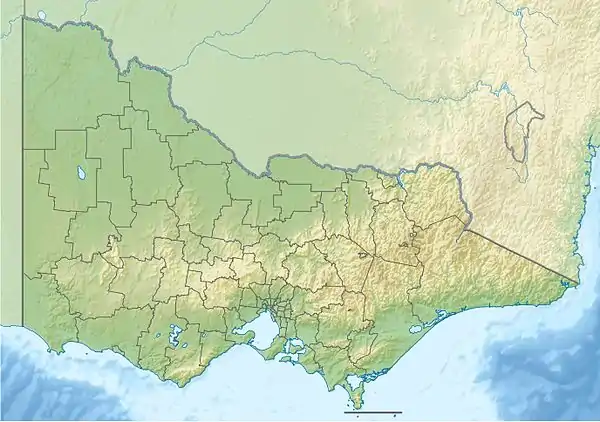| Mount Kaye | |
|---|---|
| Highest point | |
| Elevation | 998 metres (3,274 ft) (approx) AHD [1] |
| Coordinates | 37°23′40″S 149°14′50″E / 37.39444°S 149.24722°E |
| Geography | |
| Location | Victoria, Australia |
Mount Kaye is a mountain in the Coopracambra National Park, north of the township of Cann River in East Gippsland in Victoria, Australia.[2][3]
Geology
The Mount Kaye Range is an outcrop of black and white Noorinbee Granodiorite, exposed on slopes and peaks. Small streams draining the range descend 300 metres (980 ft) in a series of falls and cascades to the Cann River at the base.[4]
Flora
The area between Mount Kaye and Mount Denmarsh, together with the nearby Back Creek catchment, has high biological significance, containing a large number of rare plants including Long-leaf Bitter pea (Daviesia wyattiana), Tasmanian Waxflower (Philotheca virgata), Genoa Grevillea (Grevillea parvula), Finger Hakea (Hakea dactyloides), Rusty Velvet-bush (Lasiopetalum ferrugineum), New South Wales Pomaderris (Pomaderris ledifolia) and Monkey Mint-bush (Prostanthera walteri).[5][6] The furthest extent of distribution for many sub-alpine species from Tasmania as well as eastern New South Wales species is reached at the Mount Kaye area.[5] An area of 8,100 hectares (20,000 acres) around Mount Kaye is designated as a Remote and Natural Area under the National Parks Act (VIC).[2][7]
Access
The nearest sealed road to the mountain is the Monaro Highway which runs along the Cann River valley 4 kilometres (2.5 mi) to the west.[1] There are four-wheel drive tracks near Mount Kaye, however these are overgrown with difficult stream crossings and are suitable for emergency access only.[2] Walking to the peak requires navigational skills and is physically demanding.[8]
See also
References
- 1 2 "Mount Kaye". Bonzle Digital Atlas. Retrieved 23 March 2013.
- 1 2 3 "Coopracambra National Park Management Plan" (PDF). Parks Victoria. August 1998. Archived from the original (PDF) on 4 March 2016. Retrieved 23 March 2013.
- ↑ "Place Name Search: Mount Kaye". Geoscience Australia. Retrieved 23 March 2013.
- ↑ "8723-6 Mount Kaye Range". Victorian Resources Online - East Gippsland. Department of Primary Industries. Retrieved 23 March 2013.
- 1 2 "East Gippsland Area Review" (PDF). Land Conservation Council. Retrieved 23 March 2013.
- ↑ "Grevillea parvula". Flora of Australia Online. Department of the Environment and Heritage, Australian Government.
- ↑ "Mount Kaye Remote and Natural Area". protectedplanet.net. Retrieved 23 March 2013.
- ↑ "Coopracambra National Park Visitor Guide" (PDF). Parks Victoria. Retrieved 23 March 2013.
